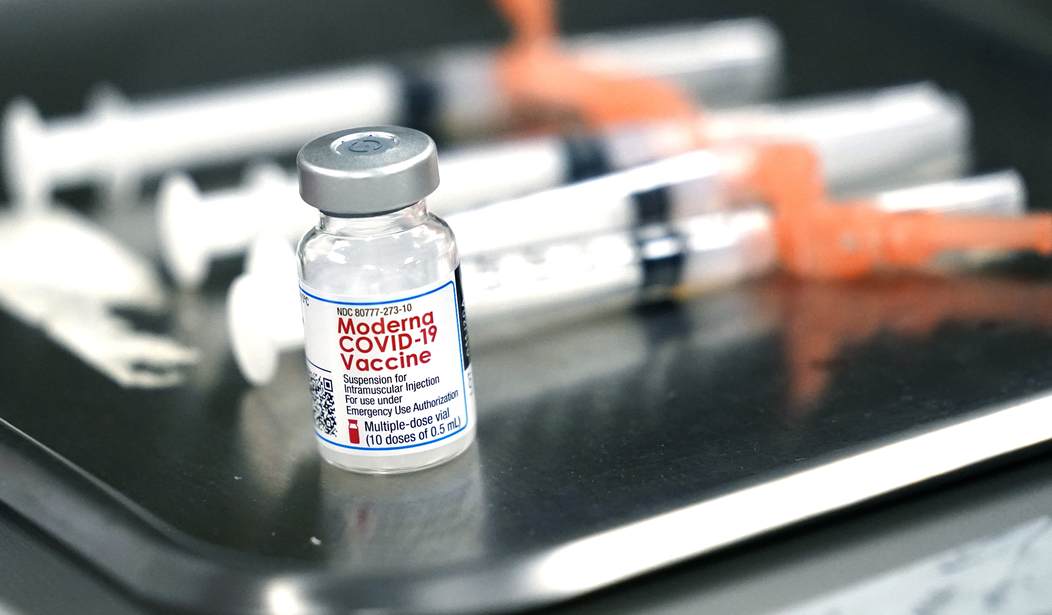The authors of this study are careful to say that their results can’t properly be used for comparison purposes since the number of subjects in each trial is too small and unrepresentative of the population to draw firm conclusions. But there does seem to be a weak sister among the three vaccines tested, as we’ll see.
NIH’s goal here was simple, posing and answering two questions. Is it safe for someone who had two doses of Vaccine A to get a booster with Vaccine B? And does the booster of Vaccine B do what it’s supposed to do, namely, increase binding and neutralizing antibodies in a person who initially had Vaccine A? Answers: Yep and yep. No matter which combination you try among Pfizer, Moderna, and Johnson & Johnson, you’ll get a substantial surge in antibodies and you’ll likely have the same sort of mild (or no) side effects that you had after your first two doses. That makes the winter booster campaign logistically simpler for the U.S. since people seeking boosters will no longer need to go hunting for the same vaccine they received initially. Pending FDA approval, you’ll be able to get whichever one you like as a third dose.
As we’ll see, though, there’s a major catch to the data. More on that in a second.
There are a lot of numbers here but they were testing nine different combinations of vaccines so there has to be.


They tried each of the three vaccines as boosters on a sample of people who collectively had had each of the three vaccines as their first and second doses and then tracked them to see what their binding and neutralizing antibody counts looked like on day one, day 15, and day 29. Again, we’re not supposed to draw conclusions about relative efficacy by comparing regimens but two things are obviously true in broad strokes. People who got Moderna have big antibody counts, especially if they got it for all three shots. After 15 days, the Moderna/Moderna combo had the highest count of both types of antibodies. People who had Pfizer or Johnson & Johnson as their original vaccine also had higher counts after being boosted with Moderna than they did with any other vaccine.
On the other hand, people who got Johnson & Johnson had smaller antibody counts, especially if they also got J&J as their booster. The J&J/J&J regimen produced roughly 1/30th as many antibodies as the Moderna/Moderna regimen did after 15 days. Which means the takeaway from all this seems clear: No matter which vaccine you got initially, an mRNA vaccine is the way to go for the booster. Especially if you had J&J to start with.
But isn’t Moderna also clearly superior to Pfizer among those mRNA options? It consistently generated more antibodies than Pfizer did across these trials. That’s where we come to the catch, though: The dose of Moderna that was tested in this study is literally twice as big as the dose that the company has asked the FDA to authorize for a booster. Moderna is seeking federal approval for a 50-microgram dose; NIH’s study tracked people who got 100 micrograms as their third dose. Oops.
If the 100-microgram dose is producing blockbuster antibody counts, why does Moderna want to scale down to 50 micrograms for public consumption? Probably because of this:

The top row tracks side effects from Moderna’s 100-microgram booster. The bottom row tracks side effects from Pfizer’s 30-microgram booster. As you can see, more people experienced moderate and severe side effects from Moderna than they did from Pfizer, which is probably a function of the size of the dose. The vaccine companies are aiming to find a “sweet spot” where the size of the dose produces lots of antibodies but few adverse consequences. The 100-microgram Moderna dose missed that sweet spot.
So where does that leave us with the data? What are we supposed to make of the antibody numbers for Moderna up above knowing that the actual dose any of us receive will be half as potent as the dose reflected in those numbers? I assume it’s not nearly as simple as “half the dose means half the antibodies.” More likely, I’d guess, is that the feds will conclude that a third dose of either mRNA vaccine is broadly comparable to the other so go ahead and get either. Although if you had Moderna initially instead of Pfizer, you can expect a bigger bang from your booster thanks to the larger 100-microgram dose in that original Moderna regimen.
Exit question: Will the FDA authorize any Moderna booster at all? Since the initial dose was so large and recipients are holding up well, it’s a closer call than it was for authorizing Pfizer’s third dose.








Join the conversation as a VIP Member